
On getting more life out of life, without spending a plug nickel
It was just shy of three pm, that time of day in the northern part of the United States in winter which signals a fast-dropping sun and temperatures to boot. Behind and beside me, two young girls with helmets on rode ponies and worked on their posting trots.
The sun was just at the point where it had begun to cast long shadows onto the grounds where her big rescue goat was rummaging through the grass for goodies.
I was standing with Felix, a dun with a long dark line along his back. His head was down, and he had dropped (a male horse will "drop" his penis when he's very relaxed). That happens when I work on male animals of any kind, to the silly delight of male stable hands.
Sexual idiocy knows no bounds; when a male tiger did the same thing during my massage, the handlers' collective IQs dropped about twelve hundred points. They missed the miracle of trust that had occurred between the full-grown, 500-lb tiger and myself, a person that animal had never seen before.
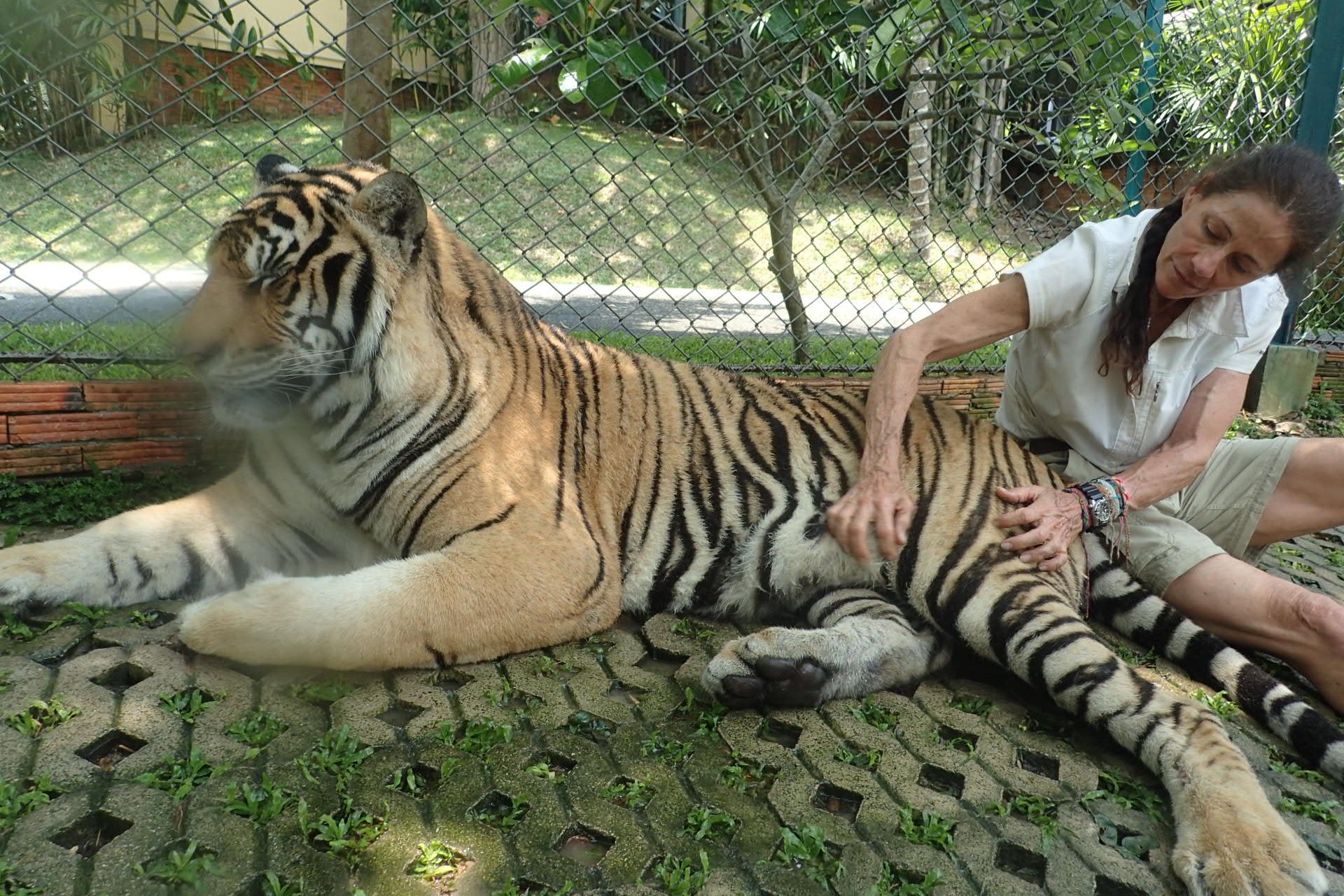
Men. I give up.
Trot out a penis and boys go stupid. But I digress.
I'd been working on three different horses at Em's request. Em owns Bar None, my new stable, where I am slowly getting to know and be known by the horses. Em simply points me at horses who need handling for some reason or another, to calm them or soothe them from previous owners. I'm good at this. And right now, with one arm in a sling and freshly out of surgery, I can't ride for a short while.
However, working on big animals helps me heal.
I dearly love a horse woman who gets another horse woman. EM is happy to use me to work on her babies until she can work on my skills. So Felix stood while I scratched his ass cheeks, a rather intimate spot that rarely gets that kind of attention by groomers. A good ass scratch makes a happy horse, dirty fingernails and makes time slow way, way down.
I have never, ever, ever been kicked by a horse I'm working on. Not even in Kazakhstan, where the local riders screamed at me that I was about to be kicked into next Sunday when I worked on their horses' butts. Nope. The horses dropped, fell asleep, and the worst damage they did was to lick my hands. Any damage was to the riders' egos.
As I looked up to enjoy the long bands of sunlight that lay across Em's property, a flock of turkeys made their way from left to right. This time of year they're everywhere. Sometimes the toms toddle up on my porch in order to lord it over the ladies from above, showing off their tail feathers to the girls.
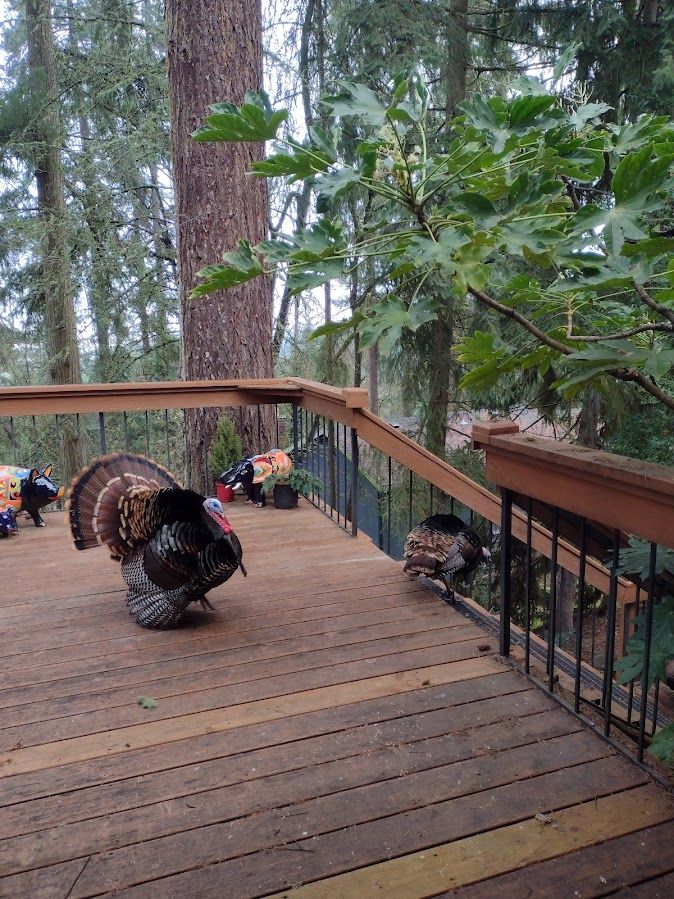
In that moment, watching the turkeys backlit by the sun, their long gaggly shadows making a dance of it as they headed for the neighbor's pastures, time stood still. Again.
Everything slowed, even my perception of the turkeys. I leaned into Felix's body, let his warmth press against my chest as I scrubbed under his tail. I breathed in the dusty horse smell of him, all hay and happiness and heat.
Every single time I work on an animal it's the first time for us both. Once the animal understands what I can do with my hands, they relax utterly. If I stop, they will position their body for me to return to a favorite spot. It's completely predictable. I watch their head and ears to make sure I'm not annoying them, and if I do, I shift immediately. And, I stop every so often to allow them to smell my hands.
That way they associate the good feeling with the smell of themselves mixed with the smell of my hands. It takes time. Slow time.
Because I never know what's going to transpire, I keep a beginner's mind of not knowing.
Shoshin is the term in Zen Buddhism for beginner's mind:
It refers to having an attitude of openness, eagerness, and lack of preconceptions when studying a subject, even when studying at an advanced level, just as a beginner would. (author bolded)
This especially struck me:
The phrase is also discussed in the book Zen Mind, Beginner's Mind by Shunryu Suzuki, a Zen teacher. Suzuki outlines the framework behind shoshin, noting "in the beginner's mind there are many possibilities, in the expert's mind there are few."[2] (author bolded)
The moment I decide I know, I have gone stupid. I can no longer learn. I hurry up, convinced of my invincibility, the rightness of my actions. Time speeds up, I lose track, and all too often lose my way. Because of course, I know where the hell I'm going, I'm the almighty authority here, right?
Men and directions, right?
Wrong.
Let's to back to the magical moment at Bar None.
I never know what kind of mood the animal will be in, and I never know how my mood will affect the animal. Even if the creature knows me and what to expect, the exchange will be brand new. That requires that I be very present, not only to my state of mind but also the animal's.
When you work on large animals, which in my case has included elephants, donkeys and even tigers, you'd better bloody well be in the moment or you might not last long.
However the bigger lesson is how doing such work has allowed me to relearn wonder.
The Irish donkey below had badly injured himself by getting tangled in barbed wire. It took me four days, but at the end, he was backing his butt into my face as I sat on the feed bucket, and asking me to gently scratch and massage the area right around his grievous wound. That is trust. Trust is earned.
You and I have to ask permission to touch. The animal gets to decide if trust is given. Mistakes can range from disastrous to deadly. However, once I begin my work, which for this boy began at his shoulder and worked up, he angled himself to where he wanted my hands to do the work. He was supremely eloquent.
And no, I do not do this in the wild. Only animals used to humans.
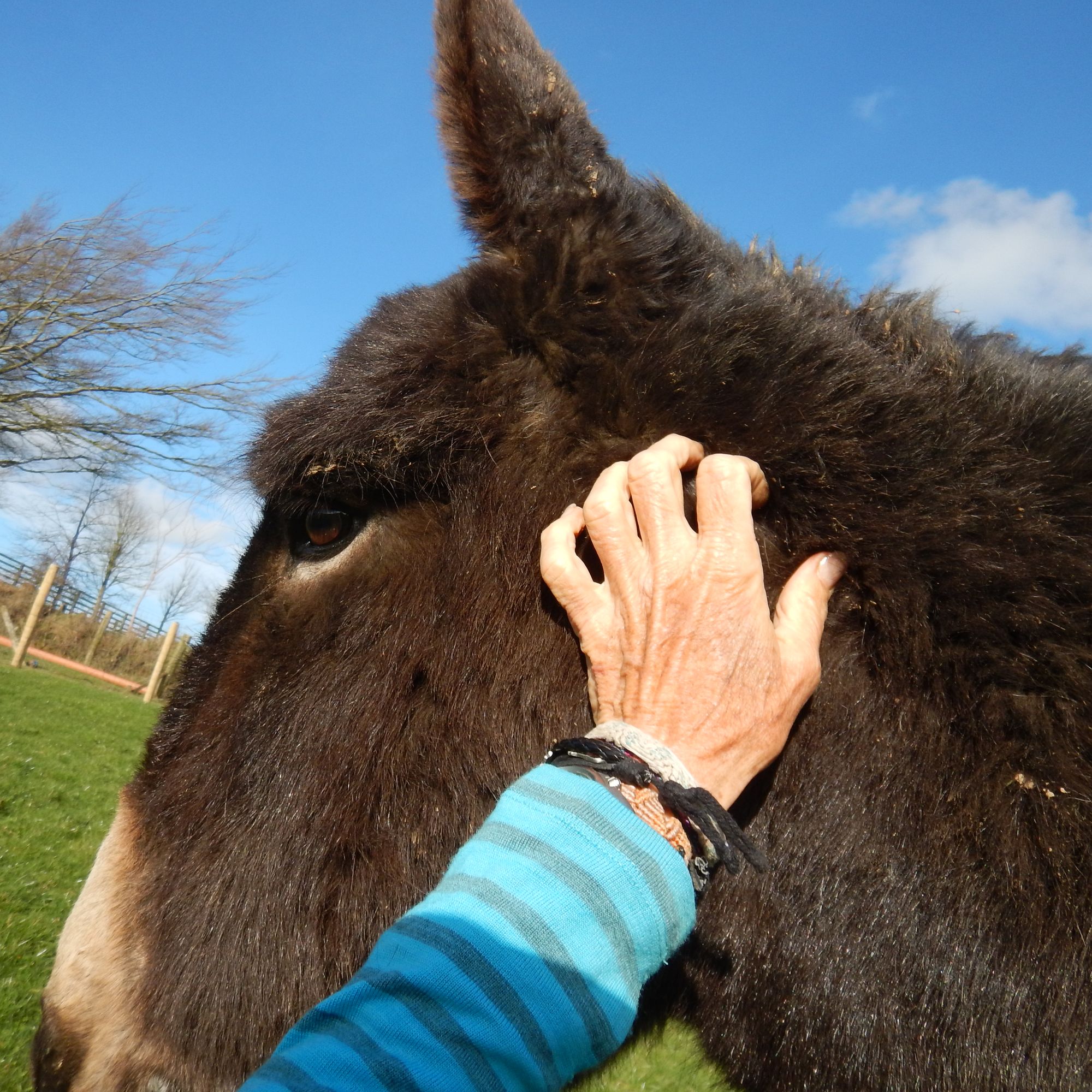
This National Institutes of Health study explores how being mindful can slow down our perception of time. There's another aspect to this, though.
There's a great line in the movie Out of Africa wherein Denys Finch Hatton, in talking with Karen Blixen (Robert Redford and Meryl Streep, respectively), says,
...Nothing they do is half-hearted. Everything they do is for the first time: they hunt, they eat, they mate...
We humans get bored. In today's society we over-schedule, over work, over achieve and overdo every single bloody thing, filling every living second with so much busy-ness and repetitive activity that time is sucked up like billions of krill in a whale's mouth.
We equate boredom with laziness, laziness with sloth, sloth with fat, fat with moral inferiority. So now we're sick and dying from toxic productivity.
Yet allowing ourselves boredom, which is a real art in and of itself, is part of the key to slowing time down and actually enjoying life more.
I've been writing a lot recently about toxic productivity, and how that ate my life for years. I've also instituted one simple trick which has already begun to pay big dividends: I instituted Hump Days, which are Wednesdays taken off. I spend them all over the state, often on the coast. No agenda. Coffee thermos, seasonal clothing and no computer. My phone goes along for emergencies and photos, but not work.
I chose just this one thing, and time is already slowing down for me. Here's a way to think about making such changes:
:extract_focal()/https%3A%2F%2Fs3.amazonaws.com%2Fpocket-syndicated-images%2Farticles%2F2510%2F1574174768_RTR30773-e1542891393133.jpg)
From the article:
Luckily, Zen Buddhism is predicated on principles of simplicity. Leo Babauta, founder of Zen Habits and author of several courses and e-books on habit-changing, explains it with characteristic minimalism in this blogpost.
In order to make any change in one’s life—whether it’s to get out of debt, become fit enough to run a marathon, or get on better with your family—he says, start with a single change. It should be small; not a goal, but a tiny first step. It could be to run for ten minutes; to spend two minutes drawing; to prepare a healthy work lunch for one day a week. It could be to stay in hard conversations for a moment after you want to leave, and spend that moment trying to listen.
As a practicing-but clumsy Buddhist, this appeals immensely. It also works.
Slowing down my week by pulling the plug on my propensity to prove my worth by over-producing jerks me bodily into the present. It has reinstated joy.
That joy has begun to spill over. So when Em invited me to spend the afternoon at her stable, my inner task master, which points at the piles of work that need doing, got told WHOA. I walked away from my habit of spending Saturdays, above all my favorite day of the week, working, and invested in getting filthy dirty, covered with mud, sweat and horsehair, and returning deeply happy.
I dressed for warmth and left. Met two young riders, schlepped myself and my arm in a sling down to the sunny riding pen and went to work on one of the loose horses at Em's request.
The rest of the day slowly slid by, a combination of girlish giggles, the plocky sound of cantering in soft mud, the occasional whinny. Horses sighed and cocked a hind leg in relaxation as I scrubbed butts, withers and my favorite, softly smoothed my hands over their eyes. There is something immensely soothing when you stroke a horse's eyes ever so gently.
Perhaps my greatest pleasure is the treasure hunt of finding a new horse's giggle spot, or that place on their body that feels SO GOOD that their chins wiggle, their heads go willy-wonkers and they really do not want you to stop. Most, but not all, horses have them.
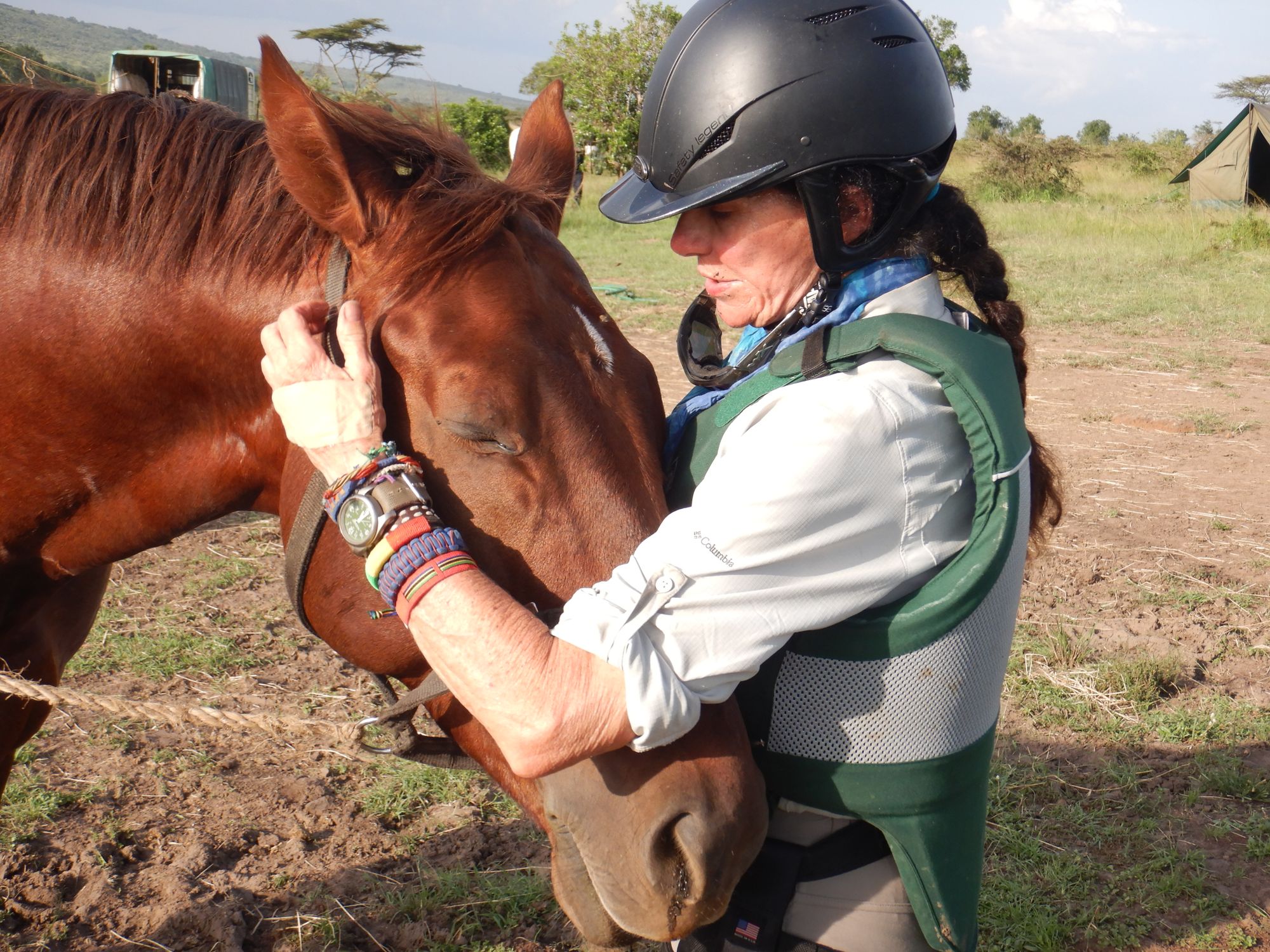
Time slows down. The turkeys tiptoed their way across the acreage. The big white male goat, feeling his oats, bit one of the hen's tail feathers and lifted her bodily into the air, squawking, until the feathers gave way. Em immediately ran to her rescue, cuddling the poor hen until she calmed down. The goat snuck up behind me and I shooed him away, not being willing to lose part of my own ass to his tough teeth.
Em, her greying hair a wildly curly (like mine) halo around her head and warm face traced with wrinkles, grinned at me as she put away the tack.
"Where did the time go?" she laughed. We'd been in the pen for three hours.
I knew. It had swirled around me like a gentle cloud, allowing me to savor every second, every horse hair tickling my nose, every affectionate dog lick from her fur babies when they spilled out of the house all pants and grins and eager for belly rubs.
Everything in life is for the first time. Everything. Because the body is in constant renewal, even sex with a longtime partner is still new, but not if we don't see it that way.
We get jaded because we choose to. When we get jaded, we fill our time to pass the time, as though time itself were the burden.
Until suddenly we're out of it, both time and the physical agency to do anything in life, and it becomes achingly clear just how precious a resource it really is.
You can slow down time by seeing the shimmering newness in every single thing. I didn't say it was easy. But it starts with a different practice, that practice becomes a part of us. Sometimes that small practice changes everything. Start small, dream big, slow down, and watch time stretch out like a sweet piece of salt water taffy.
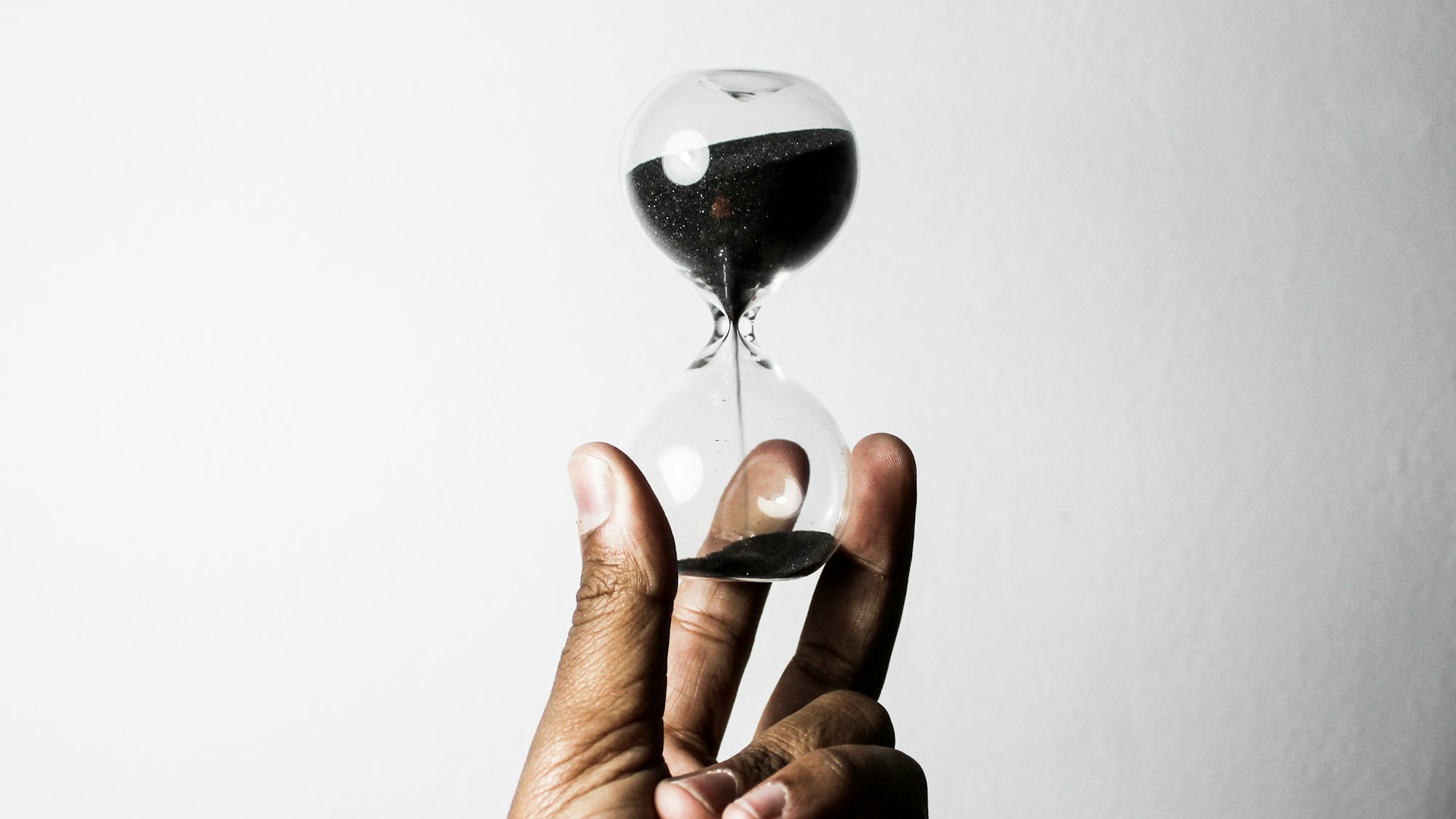

Comments powered by Talkyard.